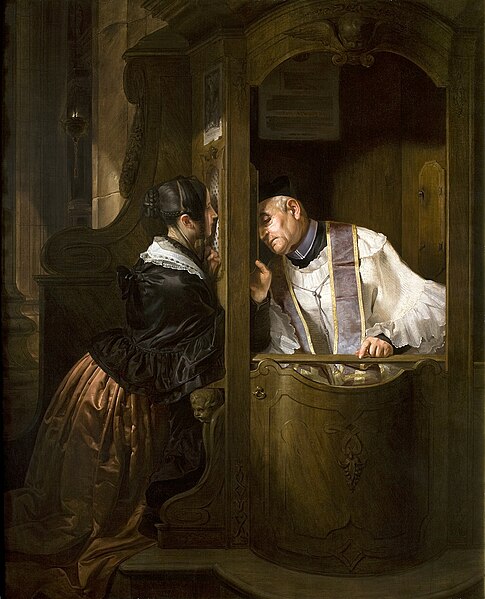Absolution is a theological term for the forgiveness imparted by ordained Christian priests and experienced by Christian penitents. It is a universal feature of the historic churches of Christendom, although the theology and the practice of absolution vary between Christian denominations.
The Confession by Giuseppe Molteni, 1838
A depiction of the general absolution given to the Royal Munster Fusiliers by Father Francis Gleeson on the eve of the Battle of Aubers Ridge.
Traditional confessional from Sicily.
An Evangelical Lutheran confessional in Luther Church (Helsinki, Finland); the Augsburg Confession divides repentance into two parts: "One is contrition, that is, terrors smiting the conscience through the knowledge of sin; the other is faith, which is born of the Gospel, or of absolution, and believes that for Christ's sake, sins are forgiven, comforts the conscience, and delivers it from terrors."
Penance is any act or a set of actions done out of repentance for sins committed, as well as an alternate name for the Catholic, Lutheran, Eastern Orthodox, and Oriental Orthodox sacrament of Reconciliation or Confession. It also plays a part in confession among Anglicans and Methodists, in which it is a rite, as well as among other Protestants.
La Penitente by Pietro Rotari
A 17th-century depiction of one of the 28 articles of the Augsburg Confession by Wenceslas Hollar, which divides repentance into two parts: "One is contrition, that is, terrors smiting the conscience through the knowledge of sin; the other is faith, which is born of the Gospel, or of absolution, and believes that for Christ's sake, sins are forgiven, comforts the conscience, and delivers it from terrors."
The reproach of Nathan and the penance of King David (Paris Psalter, folio 136v, 10th century).
Russian Orthodox priest hearing confessions before Divine Liturgy








